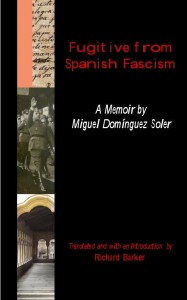Book review: Memoir of a survivor
 Fugitive from Spanish Fascism. A Memoir. By Miguel Domínguez Soler. Translated and with an Introduction by Richard Baker. Cornerstone Press, 2010.
Fugitive from Spanish Fascism. A Memoir. By Miguel Domínguez Soler. Translated and with an Introduction by Richard Baker. Cornerstone Press, 2010.
Miguel Domínguez Soler, a young Spanish Socialist worker, committed to republican and democratic ideals, had to flee his hometown of Huelva at the beginning of the Spanish Civil War in July 1936, after the Fascists took over the town. This memoir is based on the diaries he wrote throughout the turbulent and terrible years that followed the Fascists’ coup, from 1936 until the end of World War II.
Fugitive from Spanish Fascism (excerpt here) is one of those books you just cannot put down. It is a riveting tale of survival in the midst of dangerous conditions. Based on autobiographical writings, this memoir truly reads like a historical novel, full of adventures and close encounters with death. The narrative takes us from the atrocities of the Spanish Civil War, escape across the river to Portugal, years trying to evade deportation, experiences as a slave worker during the Nazi occupation of French Morocco, and exiled life as a worker in sardine-packing factories in Morocco. Miguel constantly voices a passionate critique of fascism and its multiple injustices, and his story offers an exemplary tale of struggle for freedom and preservation of one’s integrity against all odds. As he puts it towards the end of the book: “I have always been and always will be a free man until death….One thing is the appearance of liberty, and another is the freedom one forges and maintains in one’s heart.”
Miguel Domínguez Soler’s story begins in Ayamonte, Huelva, when the governor asks for supporters to defend this border town, “since the most immediate danger would come from Portugal, ruled by the dictator Oliveira Salazar.” He recounts how, twelve days later, he was woken up, astonished by the news that the authorities had fled, and that he needed to become a fugitive in order to survive. A Portuguese smuggler, “The Pope,” helped him in different moments throughout his journey, but he mainly gave him the tools to subsist and to flee.
After a few days in the forest, Miguel returned to town and hid in various houses. There he learned about the hundreds of executions without trial of many of his friends: “It’s the town’s ‘rich kids’…who break into the houses of the poor with their blue overalls…smelling of dried blood and gunpowder. They are in league with the priests and military men, in other words, the cross and sword….”
Throughout the memoir, Miguel stresses how the war was caused by an anti-democratic alliance of the upper classes, many of them from the Falange Española, with the Catholic Church and the military. He pays homage to all the victims of the Fascist regime by remembering the tragic stories of a few: the schoolteacher, the anticlerical Freemason, the builder, the mothers who were shaved and humiliated publicly. Besides being a fascinating text, this book could be used as an excellent teaching tool for students.
Miguel survives because he crosses the frontier and lives in Portugal during most of the war. Portuguese leftists, fighting Salazar’s dictatorship, had formed a strong net of support for Spanish Republican refugees. Throughout his many perilous adventures in Portugal, Miguel’s ingenuity as an “intellectual worker,” as he called himself, and his talent for learning languages helped him blend in with diverse social circles. Even among the Portuguese Left, he found himself eloquently defending the Republic as the only democratic option. He quotes himself: “The military insurgents have three essential things they need: arms, foreign support and lies. They claim to be leading an anti-Communist crusade, which is absurd because there had only been four Communist deputies in the parliament. Their only aim is to end democracy. Germany and Italy want to extend their economic control over Europe.”
In 1939 Miguel escaped to Morocco to start a new life running a factory in the sardine-packing industry. But with the Nazi occupation of France and General Pétain’s political alliances, the French gendarmes targeted Spanish refugees, and many were taken as slave laborers, forced to build the Trans-Saharan railroad in the middle of the desert. The operation was like a concentration camp, where discipline was enforced through the cruelest punishments. Months later, he was saved from that nightmare by Monsieur Mallein, who despite technically “owning” him, had become his friend, enabling Miguel to work under better conditions.
Miguel frequently expresses the wishes of many Spanish exiles that the liberation from Fascism in Europe would mean the end of Franco’s dictatorship. Like many others, he would be bitterly disappointed.
Miguel also managed to find a partner, a lover, and a wife in a Moroccan girl named Abouch, laughing “at all religions” and defying all the racial prejudices they had to endure. It is thanks to Abouch that we are able to read his memoir, as the excellent introduction by Richard Baker explains.
Fugitive from Spanish Fascism is well edited and well documented, with useful and illuminating footnotes. The text is lovingly and carefully translated into English, breathing life into Miguel’s voice. I recommend it to anyone interested in reading a poignant tribute to freedom.
Cecilia Enjuto Rangel teaches in the Spanish department at the University of Oregon.















This fine book is just one example of Richard Barker’s ongoing work to give voice to those who survived the Civil War.